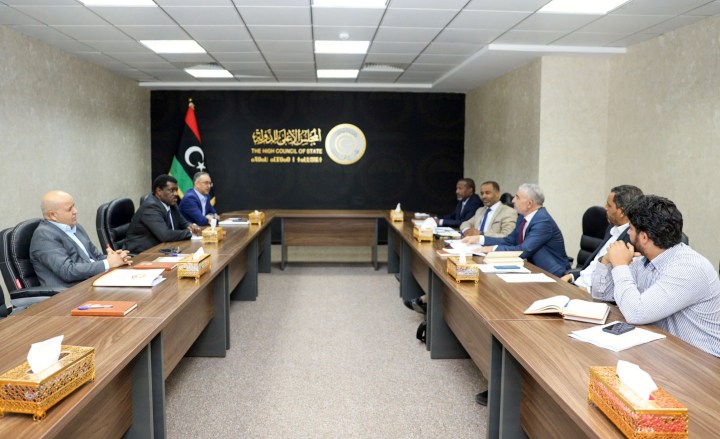ISS TODAY OP-ED
Libya rival governments propose merger before elections — international community fears political upheaval

Tripoli and Tobruk plan a reunified government, but the UN and wider international community are wary of this approach.
Libya has found itself in an anomalous predicament. Its two deeply divided and competing governments are in rare accord about how to take the riven country forward — but the international community largely opposes them both.
In July, the House of Representatives in the eastern city of Tobruk, and the rival Tripoli-based High State Council in the west, approved a plan emanating from the ‘6+6 committee’, which represents both sides. This was to form an interim government that would reunite their two administrations and take the country into elections to choose a permanent government.
But the United Nations (UN) and most other external actors have opposed the deal, insisting on elections before a new government is formed. The plan enjoys the support of the east-based military strongman Field Marshal Khalifa Haftar, which is perhaps both a plus and a minus.
The UN, Western governments and some Libyans, fear that stitching together a unity government would diminish stakeholders’ incentives to follow through on their electoral commitments, reinforcing the status quo. Proponents of the plan warned that the turbulence of elections could upset the fragile peace that has prevailed for over a year.
And indeed, the peace was shattered in August when rival militias clashed in Tripoli — both however on the side of the Tripoli government. Differences over the proposal for a reunified government may have caused the fighting. Haftar’s support of the plan has provoked opposition to it among some militias in Tripoli who are deeply suspicious of his motives.
Claudia Gazzini, International Crisis Group Senior Analyst on Libya, punted the 6+6 committee’s proposal: “If it garners sufficient support, the plan could be an important step towards healing the rift that has placed Libya under the split administration of two separate authorities for much of the past decade. But it still faces significant obstacles, with influential critics both inside and outside Libya”.
She said the plan seemed the most promising way to reunite the country, given the insurmountable challenges of holding elections while the country remained divided between two competing governments.
Post-Gaddafi turmoil
Libya has lurched from one crisis to another since Muammar Gaddafi was overthrown in a popular rebellion backed by a North Atlantic Treaty Organization (Nato) intervention force and others in 2011. After the country plunged into protracted civil war, the two rival governments were briefly reunited in 2020 when a military assault by Haftar reached the outskirts of Tripoli before being repulsed, largely by Turkish forces.
But then in February 2022, following botched elections two months earlier, a deal between the two sides to replace the Tripoli-based government of Prime Minister Abdulhamid Dabaiba collapsed. The Tobruk administration asked Fathi Bashagha to form a parallel government, and the country returned to two separate and squabbling regimes. In March this year, Tobruk replaced Bashagha with his finance minister, Osama Hamad, in an acting capacity.
Libyans and their foreign backers have been unable to agree on whether to reunite the government through fresh elections, a power-sharing deal, or a new constitution. The UN has insisted on elections first, as enshrined in UN Security Council Resolution 2656 (2022). There are also sharp differences over who should lead reunification efforts: the rival assemblies, the principal political actors on the ground, or a new UN-led forum.
The 6+6 committee, created to draft an electoral law, claimed to have resolved key disputes such as those over the sequencing of presidential and parliamentary elections and eligibility requirements for presidential candidates that scuppered the 2021 elections. The Tobruk and Tripoli administrations remain divided on some of these issues, although they have agreed on an interim government before elections.
Perhaps the most formidable obstacle to the plan is that Dabaiba, who has hitherto clung tenaciously to the prime ministership, would probably resist any efforts to unseat him without elections. The August clashes appeared to reinforce these concerns, suggesting Dabaiba’s faction was indeed resisting the 6+6 committee’s plan.
The plan also needed international support, and the UN and Western opposition seemed fatal. There are some signs that their positions may be shifting, though.
Addressing the UN Security Council on 22 August, UN Special Envoy for Libya Abdoulaye Bathily said a “unified government, agreed upon by the major players, is imperative for leading the country to elections”. However in a statement this week, his office said the issue of a “unified government to lead the country to elections and close the chapter of interim governments’ remained contentious”.
Riccardo Fabiani, North Africa Director for the International Crisis Group, told ISS Today that Bathily’s statement had been a “hint at the idea” (of an interim government first) “but not a full-hearted endorsement”. He said the August militia clashes in Tripoli, floods that killed thousands in Derna last month, growing divisions in the eastern government, and the tepid international support all undermined prospects of an interim government.
Silvia Colombo, Libya and Mena expert at the Nato Defense College in Rome, told ISS Today that there appeared to be growing convergence, domestically and externally, on establishing an interim government before holding elections.
“But this is not in itself a guarantee that this government will see the light. If it does, it could be a step forward compared to the political and institutional stalemate Libya has been suffering for almost two years. Another point is whether this government will have enough power and legitimacy to move forward with the elections. They cannot be postponed indefinitely. And the UN won’t have major carrots and sticks to push the parties in that direction.
“More than ever, this is in Libyans’ hands. This is even more so, given the regional context and what is happening in Israel and Palestine.” DM
Peter Fabricius, Consultant, Institute for Security Studies (ISS) Pretoria.
First published by ISS Today.



















Comments - Please login in order to comment.